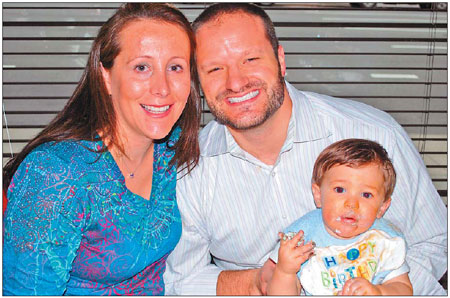Health
Double challenge
Updated: 2011-05-11 08:19
By Lauran Neergaard (China Daily)
|
Dianna Fiore Radoslovich of New York, with her husband Steve and son Steven Andrew, celebrates his fi rst birthday. Associated Press |
Women with physical disabilities require more assistance to give birth, but they're not getting it. Lauran Neergaard reports.
Her fi rst pregnancy brought Dianna Fiore Radoslovich a break from the weakness and pain of her multiple sclerosis (MS). She put away her cane and her meds and gave birth to a healthy son. Pregnancy No 2 hasn't brought the same reprieve. Th is time, Radoslovich juggles the cane with a toddler, a growing baby bump and a bit of anxiety. "Every pregnancy's diff erent, and MS is diff erent every day for everybody," says Radoslovich, of New York City, who has been learning along with her obstetrician how to make adjustments.
Physical disabilities add a whole new challenge to pregnancy. And while the vast majority of women with disabling conditions appear to have healthy babies, specialists say far too little is known about mothers' risks of complications, their special needs and barriers to good care.
Millions of women of childbearing age have a physical disability - meaning they report needing some sort of assistance with daily living because of such conditions as MS, rheumatoid arthritis, spinal cord injuries or cerebral palsy, says a recent report in the journal Obstetrics & Gynecology.
Yet when the National Institutes of Health convened experts to examine the issue, they couldn't even fi nd a good estimate of how many of those women give birth each year.
It's "a real invisible population", National Institutes of Health researcher Dr Caroline Signore said at a meeting of the American College of Obstetricians and Gynecologists in early May.
But it is one that is increasing: "There will be a growing number of women with disabilities who will desire pregnancy and come to you for care," Signore says.
Th e institute's workshop recommends a comprehensive registry to track pregnancy in women with physical disabilities and answer some key questions.
Among the priorities are following up on small studies that found preterm birth, low birth weights and C-sections may be more common among women with certain disabling conditions.
Why? Th at is not clear. But women with spinal cord injuries or MS seem to experience more urinary tract infections, a risk factor for preterm labor and thus smaller babies, Signore says.
Also, some women with spinal cord injuries may not feel the pain of early contractions or seek care soon enough.
As for C-sections, many women with spinal cord injuries are still capable of a vaginal birth but may not get a chance because of nervous doctors, Signore says.
Other questions: How might pregnancy's weight gain and fatigue aff ect balance and contribute to falls, in turn decreasing mobility and independence? What role do higher levels of day-to-day stress play? Is postpartum depression a greater risk?
But Signore, who uses a wheelchair herself because of a spinal cord injury, challenged her fellow ob/gyns to consider more than medical issues.
Few doctors own scales that can weigh women in a wheelchair, for example. Th ey should have at least one exam table that lowers to the floor for women with impaired mobility, she says.
A routine pregnancy requires 15 visits over eight months, and just getting there can be exhausting for women with mobility problems.
Signore says the challenges start at the front door, and shows photos of herself stuck outside a physician's offi ce, unable to heave open a heavy door even though its lever handle complied with accessibility laws.
Th e issue may be best studied so far in multiple sclerosis, perhaps because of some good news.
Symptoms of MS, an autoimmune disease that can wax and wane, tend to improve temporarily during pregnancy, probably because of hormonal changes.
The National Multiple Sclerosis Society notes that research has begun to test whether adding a type of estrogen to regular treatment when women are not pregnant might mimic some of that benefit.
Radoslovich was one of those lucky ones while pregnant with her fi rst child, Steven Andrew, now 1.
But about 30 percent of MS patients have a fl are-up of symptoms a few months aft er giving birth that can be severe.
Breastfeeding sometimes staves off the episodes, but did not for Radoslovich, who had to quit when a fl are-up suddenly left her unable to walk or use her right side until intravenous steroids kicked in.
Th e toddler is her morale booster: "When I'm having a bad day in terms of not feeling well, all I need is to see that smile on his face and him reach out to me and it's pure medicine."
Radoslovich was thrilled to learn she was pregnant again - a second son is due in August. But this time,the weakness, muscle stiff ness and her other usual symptoms didn't abate.
Still, her doctor says she can try a vaginal birth despite having a C-section the last time that was unrelated to MS. Radoslovich hopes she'll have the energy to make that happen.
She craves hearing how other women with MS handle pregnancy's hurdles: "I feel like, if you can do it, so can I."
Associated Press
E-paper

War of the roses
European Chinese rose growers are beating their Chinese rivals at their own game
Preview of the coming issue
High-tech park gets big boost
At the source
Specials

Sino-US Dialogue
China and the US hold the third round of the Strategic and Economic Dialogue on May 9-10 in Washington.

Drunk driving
Drunk drivers face a detention for one to six months and a revokation of their drivers' license.

V-Day parade
A military parade marking the 66th anniversary of the Soviet victory over Nazi.

